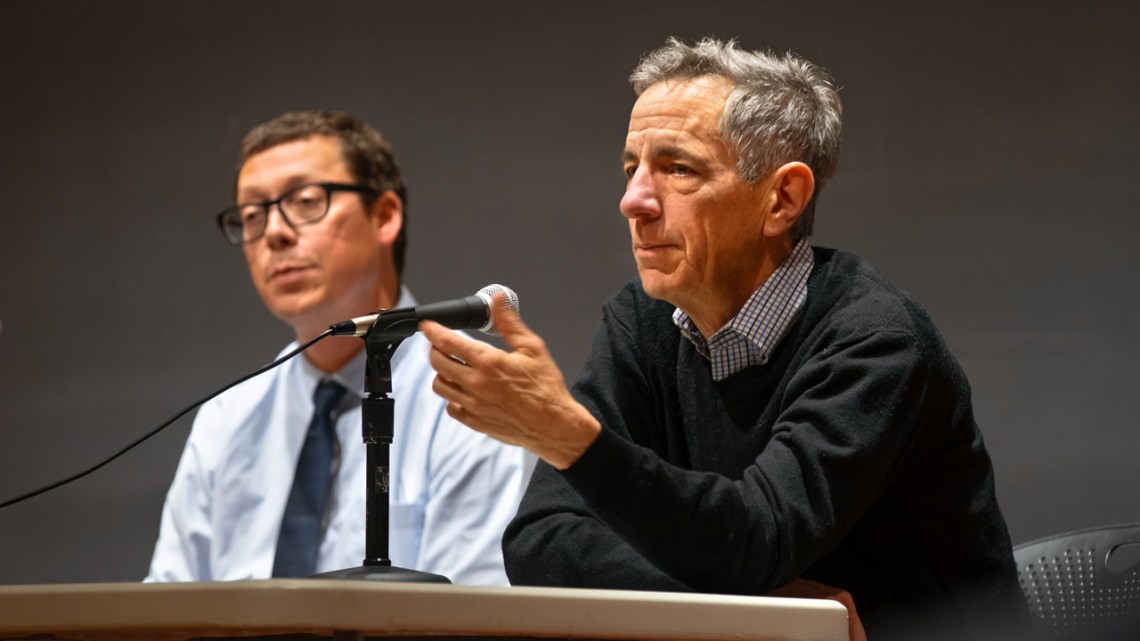
John Siliciano, deputy provost, professor of law and co-chair of the Social Sciences Implementation Committee, right, speaks at the first of two universitywide listening sessions Nov. 20 in the Biotechnology Building. At left is committee co-chair Christopher Wildeman, professor of policy analysis and management in the College of Human Ecology and associate vice provost for the social sciences.
Listening sessions inform public policy recommendation
By James Dean
A faculty committee assessing structures for a potential new school or college of public policy is completing its work after receiving input in recent weeks from faculty, staff, students and alumni.
The provost’s Social Sciences Implementation Committee will incorporate feedback from nearly 20 listening sessions in a final report to be submitted by late January to Provost Michael I. Kotlikoff and President Martha E. Pollack.
“The many listening sessions we have done have been incredibly helpful for us,” said Christopher Wildeman, professor of policy analysis and management in the College of Human Ecology, associate vice provost for the social sciences and one of three committee co-chairs.
The other co-chairs are Melissa Ferguson, professor of psychology in the College of Arts and Sciences and senior associate dean of social sciences; and John Siliciano, deputy provost and professor of law.
Since March, the committee has been charged with evaluating two options for elevating public policy at Cornell over the next 10 to 15 years: a new school that would sit between CHE and A&S, or a refocusing of CHE – which has the highest concentration of policy faculty – into a college of public policy.
The committee also will make recommendations about new or expanded “superdepartments” in the areas of economics, psychology and sociology.
The committee received support for a draft vision unveiled in September and an interim report released Nov. 18, Wildeman said, but also heard “understandable and consistent frustrations” about the potential impacts of either public policy model, particularly on CHE.
Chief among those were concerns voiced by CHE faculty, staff, students and alumni who do not see themselves as aligned with policy studies, such as in its two design-oriented departments.
Some argued that a focus on public policy would undermine the identity and mission of CHE. Others said it could weaken the value of their degrees and alumni network, or marginalize non-policy faculty.
“It’s a key question,” Siliciano said during a universitywide listening session Dec. 12 in Klarman Hall. “We’re noting it, we’re flagging it, and we’re passing it on in a very robust form to the president and the provost, who are also very aware of it.”
The committee will recommend what it believes is the best structure for public policy at Cornell, Siliciano said, but university leadership will decide which model to implement, considering all its complex implications across campus.
The committee and provost have stressed that any change would take years to implement, and would not involve job losses. The university has pledged to maintain and support CHE’s existing non-policy majors.
Siliciano highlighted one initiative progressing in parallel with the committee’s work: Leaders of CHE, the College of Architecture, Art and Planning and other key units on campus are discussing options for linking their design-related departments, potentially creating a stronger design program even if CHE’s focus shifted toward policy.
The committee fielded questions about which faculty would be included in a public policy school or college besides those in the Department of Policy Analysis and Management, the biggest single unit of policy scholars.
Wildeman said at the Dec. 12 listening session that the goal “would be for this to be a truly universitywide entity” including faculty from across the campus.
Attendees at the two universitywide listening sessions on Nov. 20 and Dec. 12 asked about a host of other details, including: how students would be admitted; if policy faculty would be co-located; in what policy issues the new entity would specialize; if commitments to support public policy and superdepartments would be backed up by new resources; and whether New York state would approve the contemplated changes to a contract college.
Siliciano noted that Cornell had wrestled with similar issues as it established organizations including Computing and Information Science; the School of Integrative Plant Science in the College of Agriculture and Life Sciences; the Cornell SC Johnson College of Business; and Cornell Tech. But many details must await university leadership’s decision about a public policy direction, which could be made in the spring semester.
“There still lies ahead an extended, multiyear effort to design and implement these kinds of organizational changes,” Siliciano said after the listening sessions concluded.
Visit the Office of the Provost’s website for more information on the provost’s review of the social sciences.
Media Contact
Get Cornell news delivered right to your inbox.
Subscribe
